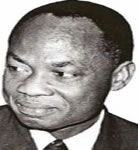|
||||||||||||||
|
||||||||||||||
We were driven in the car of a senior Federal Government official to the home of a top Edo State civil servant. He was still in bed, but received us warmly when he came into the sitting room where we were already comfortably seated. Dr. Michael Osarenogowu Agho, Professor of Chemistry at the Abubakar Tafawa Balewa University, Bauchi, was apprehensive about the fate of a building he had struggled to put up in Benin City, his hometown. A professor who practises probity is not rich and takes scholarship as his solace. Politicians build palaces and he is not envious of them. The professor had received a call in Bauchi that a task force set up by the Adams Oshiomhole government had knocked down the wall demarcating his property. He travelled to Benin City in the senior Federal Government official’s car to try to save his house. He had carefully taken all the legal steps in acquiring and building on the land. Survey and building plans were approved by government and he paid the necessary fees. Professor Agho was understandably shocked when he was informed that government had knocked down the wall without warning and had clearly stated its intention to demolish his house by flattening some houses in the same area. The government claimed the land belonged to it, but there was not even a signboard to indicate its ownership. The government did nothing while the buildings went up, but was heartlessly happy to bring them down. The senior Edo civil servant said nothing could be done to save Professor Agho’s house if it was built on government land. Professor Agho was not downhearted. There was a civilised calmness about him that was not reticence. He spoke softly but with the spontaneity and warmth of true friendship. I first met him in 2006, though our mutual friend, the senior Federal Government official, told me that we had actually met several years earlier. I remembered the place, but had no recollection of the meeting. In 2006, the three of us were driven in the senior Federal Government official’s car from Benin City to a state capital in the North. Professor Agho was returning to Bauchi. I soon got to know him pretty well. He studied in the United States and was awarded a university scholarship for superior academic performance. He returned to Nigeria after obtaining his doctorate. Professor Agho loved country music, my favourite kind of music. Our mutual friend, the senior Federal Government official, knows many country lyrics by heart. Professor Agho had studied at Texas and I sang to him a snatch of Marty Robbins’s ‘El Paso City’, a sad, haunting song about a cowboy who killed and died for love. Professor Agho was listening to country music in the senior government official’s car when he was shot dead on Sunday, May 17 near Okpella in Edo State at 9.30 a.m. There were no intimations of his death when we parted around 10 a.m. on Saturday, May 16. It was a normal parting and the present and the future held hope and no dark forebodings. Comment: DR. MICHAEL O. AGHO
Prof. Agho was violently killed by armed men on Sunday, 17th May, 2009 along Benin-Okene Expressway. He is survived by his wife, children and other relations
Subject: Re: The killing of Professor Agho The late Professor Michael Agho was my oldest brother and the killers have created a very big vacuum that would be difficult to fill in the family and nation. Having over 10 years of research and teaching, Mike would always tell me to consider coming home and contribute to research and teaching. Now that Mike is gone, my dream of coming home is gone too. I can’t stop crying; I have lost my best friend, my big bros and my idol in a very tragic manner. My questions to President Yar’Adua and Governor Adams Oshiomhole are: Who are the killers of my late brother? What are the Nigeria police doing about my brother’s case? Time will tell if the current regime is a joke or a messiah Also available at http://www.tribune.com.ng/20072009/fri/mosaic.html Kingsley Agho, PhD, School of Medicine, University of Western Sydney, Australia.
Subject: Late Professor Michael Osarenogowu Agho - first anniversary Message: On the occasion of the first anniversary of the death of my senior brother (late Professor Michael Osarenogowu Agho) who was killed by gunmen in Benin on his way back to Bauchi. Today marked a year those bastards took Mike away from us but the feelings of sadness and despair haven’t lifted from my heart. I have found myself mourning Mike everyday as if it was just yesterday Mike was taken away from us. Today the Agho family of 48 Ekewan Road, Uzebu Quarters is today reflecting on Mike’s kindness, respect for mankind and contribution to research which still outwits others - that makes me feel, that Mike was still alive – For those who don’t know Mike, he was a are rare breed!!. As for me, I am so blessed and truly have much to be thankful for to have a brother like Mike. If you want to read about Mike’s contributions to leadership initiatives in Nigeria, go to: http://www.leadershipinitiatives.org/who-alumni.htm Guys, I want us as a group to use this opportunity to discuss gun and land law reforms in Edo state as a way of celebrating Mike’s death because published research article revealed that gun law reforms in Australia reduces firearm deaths (Chapman S, Alpers P, Agho K, Jones M, 2006) and I am of the view that gun and land law reforms may also reduce firearm deaths in Edo state. Reference: Chapman S, Alpers P, Agho K, Jones M. Australia’s 1996 gun law reforms: faster falls in firearm deaths, firearm suicides, and a decade without mass shootings. Inj Prev 2006; 12: 365-372. |
||||||||||||||
|
| ||||||||||||||







